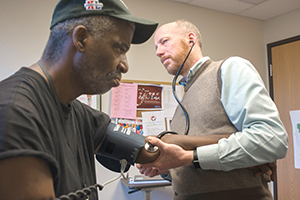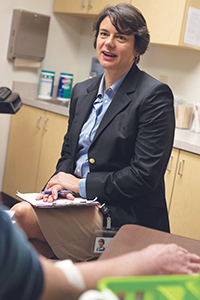By RENEE STOVSKY
John Cupps, 68, is a U.S. Army veteran who served in the Vietnam War. He lives with both mental and physical health issues related to his military service. He has been a patient at Pittsburgh Mercy Behavioral Health for many years due to post-traumatic stress disorder. And since its opening in 2012, he has been seen at Pittsburgh Mercy Family Health Center as well for numerous physical health issues related to exposure to Agent Orange, a toxic defoliant used by the U.S. military in Vietnam.

Martha Rial / © CHA
Dr. J. Todd Wahrenberger, medical director of the Pittsburgh Mercy Family Health Center, gets a blood pressure reading on Darryl Matthews.
Though Cupps' health is precarious — he has had 15 abdominal surgeries, including an ileostomy, and deals with serious, chronic heart and lung problems — he says his quality of life has improved since he became a patient of Dr. J. Todd Wahrenberger, the medical director at the family health center. "My abdomen looks like a jigsaw puzzle, and I suffer severe pain from all the scar tissue, but Wahrenberger bends over backward to help me. He's the finest physician in the whole city, and I don't say that easily," says Cupps.
"As for the family health center, it's the best operation going in town. Everyone there is on the same page — the nurses, doctors and therapists. They take care of the whole person, and they do it from their hearts. They treat you as a human being, not a number," he says. "And because they coordinate care and arrange for transportation if you need it, I'm able to live independently."
Addressing disparities
Individuals like Cupps are exactly the kind of people the family health center, a part of Trinity Health of Livonia, Mich., strives to help. Since its inception four years ago, its goal has been to address disparities in health care for the community's most at-risk, vulnerable individuals — many of whom are already being served through Pittsburgh Mercy's behavioral health care continuum.
"We offer holistic care tailored to the unique needs of people who have serious mental illness and/or people who are homeless — two historically underserved, complex, difficult-to-reach populations," says Stephanie Murtaugh, senior director of Mercy Community Health, Pittsburgh Mercy's community health division.

Martha Rial / © CHA
Dr. Brenda Freeman, a consulting psychiatrist with the Pittsburgh Mercy Family Health Center, says having a convenient family health center that is sensitive to health care barriers faced by mental health patients can improve health access and outcomes.
According to the National Institute of Mental Health, individuals with serious mental illness — including anxiety, depression, autism spectrum and bipolar disorders — die on average 25 years earlier than the general population. The premature death is often the result of chronic but treatable conditions like cardiovascular disease, pulmonary disease and cancer.
Easy access
"The problem is that many of these people do not have primary care physicians — the basic bedrock of a medical/mental health team — so they get no preventive care or ongoing care management. Most have problems like wound care issues, diabetes and hypertension that can be exacerbated by poor nutrition, alcohol and drug use, obesity and smoking," says Wahrenberger.
"Our location — on the same campus where our patients receive behavioral health (care) — is one of the keys to our success," he continues. "Psychiatrists and service coordinators are able to hand them off to us, and we are able to access information about their prior history and medications through the same system."
Another key to Pittsburgh Mercy Family Health Center's success is the team approach it uses to engage patients. In addition to family medicine physicians, its 13-member staff includes nurse care managers, behavioral health specialists, physician assistants, a consulting psychiatrist, pharmacist, tobacco cessation specialists, and two certified peer support specialists — people who are successfully managing behavioral health issues and who model healthy lifestyles. In Pennsylvania the peer support specialists are certified through a process approved by the state of Pennsylvania Office of Mental Health and Substance Abuse Services.
Pittsburgh Mercy Family Health Center serves about 4,000 patients a year, and though its original intent was to care specifically for people experiencing mental illness, intellectual disabilities and home-lessness, about 30 percent of those who access primary care there are simply members of the surrounding community. The center operates much like a traditional family medicine physician practice, providing routine physicals, immunizations, screenings, on-site lab services and management of chronic illnesses.
High-priority patients
To better care for patients, the center has developed a risk stratification tool. Those at level one, or code green, are deemed at low health risk and have good coping skills and no active physical or mental health concerns. Those at level two, or code yellow, have low to moderate health risks and may have mild physical and mental health symptoms. Those at level three, or code orange, are considered at moderate to high risk for physical or mental health issues. Those at level four, or code red, have severe mental and physical health symptoms that interfere with functioning; they lack stable housing or social supports and are distrustful of traditional health care systems.
Level four individuals are discussed at weekly team meetings involving all members of the physical and behavioral health team. Action plans include well checks between appointments and outreach by community treatment teams and peer support specialists to ensure safety, optimize well-being and reduce the risk for hospitalizations for members of this vulnerable group.
"Imagine suffering from depression, anxiety or a thought disorder, having experienced multiple hospitalizations and now being faced with medical problems. Finding a primary care physician may not be on your radar," says consulting psychiatrist Dr. Brenda Freeman. "But if your psychiatrist can suggest a checkup at a family practice (clinic) right next door, where care managers can link you with housing or transportation services, where peer specialists can provide support, and where you can feel respected" even when a person exhibits behavioral health symptoms, "then your chances of having a good experience — and ultimately staying healthy in the community — go way up."
"Our ultimate goal is to empower our patients to become active participants in their care. We want to deliver better health and better care at lower costs," says Murtaugh. "It's part of our Pittsburgh Mercy mission to be a compassionate and transforming, healing presence in our community."
Sharing information across disciplines
Communication is key to reaching that goal, adds Wahrenberger.
"Traditionally, there has not been much sharing of information between behavioral medicine and primary care medicine. At the family health center, we are all working (together) for the patient's good. We can piece together not only mental health and physical health issues, but also what is going on in a patient's family, his or her employment, housing status and so on,'' he says.
"We are still working with a very difficult-to-reach, challenging population," he adds. "But it's no longer like walking a tightrope. There is a big safety net in place now."
Copyright © 2016 by the Catholic Health Association
of the United States
For reprint permission, contact Betty Crosby or call (314) 253-3477.